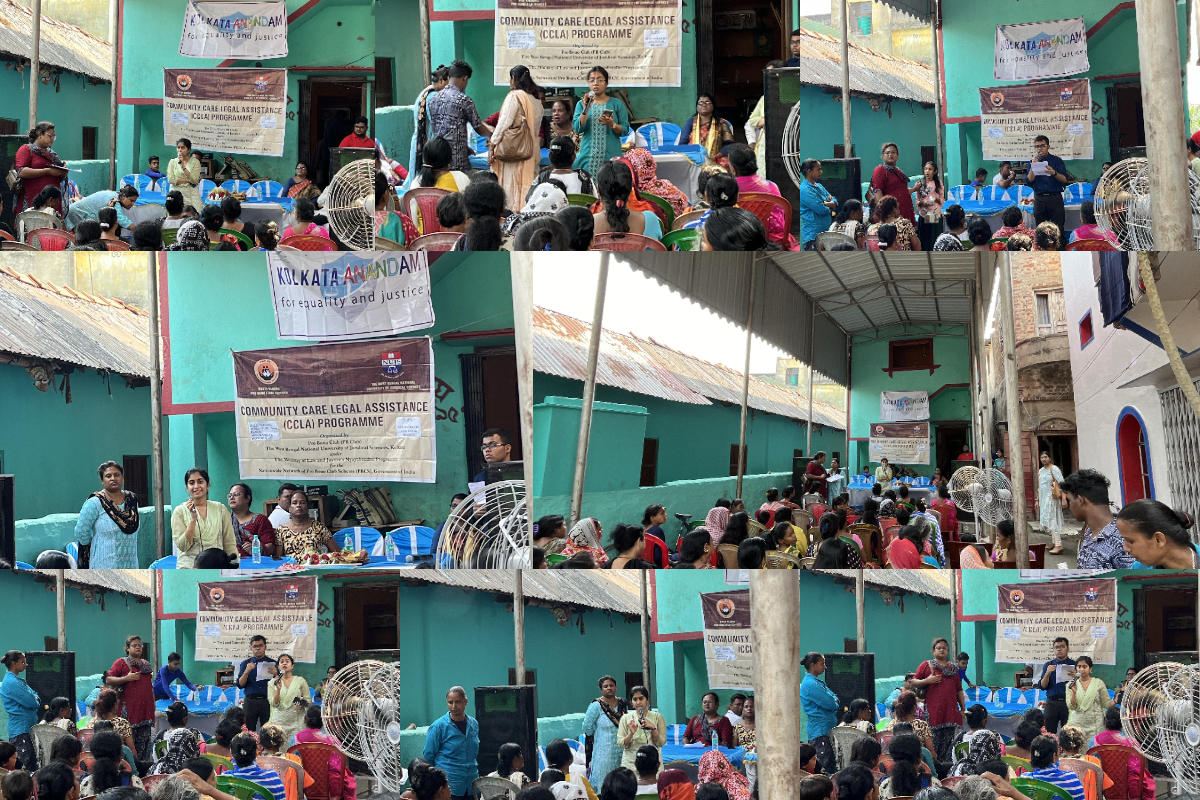On the 17th of March 2024, the Pro Bono Club (PBC) at NUJS in collaboration Kolkata Anandam for Equality and Justice (KAEJ) organised a legal awareness camp at Sheoraphuli. The camp was organised for legal awreness of the sex working community in Sheoraphuli. KAEJ has been working at the grassroot level with the community for a long time with the Secretary of the organisation being a sex worker’s child was the best organisation to collaborate in the region to conduct this camp. KAEJ provided the infrastructure and access to the community and invited the local stakeholders like Ward Councilors Mr Biswajit Singh, Raju Parui, and the Baidyabati Municipality Chariman Pintu Mahato who assured of any aid and assistance needed for the community. Along with students from across the years who volunteered for the project PBCS, The Ministry of Law & Justice’s Nyayabandhu Programme for the National wide network of Pro Bono Club Scheme, Government of India visited Sheoraphuli. The camp also saw the presence of West Bengal Durbar Mahila Samanwaya organization- the organisation that has been instrumental in voicing for the rights of the sex workers for more than few decades.
The discussion began by a brief introduction to the basic rights of sex workers. It was explained how the law views the profession as a legitimate occupation, and that they are to be afforded the same rights as a lawyer or a doctor. This part of the discussion centered around their right to live with dignity and not be harassed, be it by their clients or the police, and the fact that they had all the basic rights that are granted to all citizens of India.
The discussion then delved into the recent noteworthy Supreme Court judgement in Buddhadev Karmaska v State of West Bengal. The Supreme Court in this case had laid down several guidelines pertaining to sex workers. It reaffirmed that sex work was a legitimate occupation, and recognized that police often harass these women and refuse to take their complaints; the court stated that the same is not valid in law and police are duty bound to treat these workers with respect and heed their complaints as they would any other citisen’s. It was also highlighted that police cannot film the sex workers under the pretense of a raid, and cannot take a sex worker’s child away from them merely because they are engaged in the occupation. It was also highlighted that the Supreme Court observed that since vouluntary sex work is not illegal, sex workers in a brothel voluntarily must not be harassed or harmed during a raid. The students explained these protections, amongst others, that were contained in the judgement.
The next part of the discussion centered around the Immoral Trafficking of Women (Prevention)Act. While discussing the Act, it was highlighted that the Act does not prohibit prostitution as an occupation, but prevents the trafficking of people and also prohibits minors from engaging in sex work or compelling minors to engage in sex work. The punishment regarding such offences was also discussed.
After this, students from the society then interacted with the attendees present and asked them questions regarding their occupation and any issues they experience or have experienced that requires legal intervention. While most of them reported that they faced no legal issues, some of them reported that they needed some legal assistance.
The session was a fruitful experience for those involved, with students getting a first-hand look at the environment in which sex workers live, as well as providing important information to sex workers regarding their occupation.
Outcomes of the camp:
- Legal Awareness of the sex working community in Sheoraphuli,
- Gathering data on persons who seek to take help of the legal aid society for legal interventions in terms of pursuing a case and
- Students were exposed to the real life instances of vulnerable communities and their problems.











 Users Today : 366
Users Today : 366 Users Last 7 days : 5047
Users Last 7 days : 5047 Total views : 1105578
Total views : 1105578